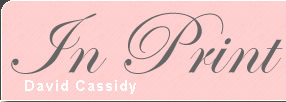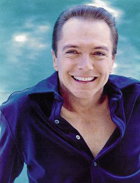
David Cassidy on the Web
David Cassidy, still on tour, reflects on days as a global idol: ‘I’m grateful for it’
Come on, he’s happy
February 8, 2016
By Roger Catlin
The Hamilton Spectator

David Cassidy, in 1971, was in the middle of his "Partridge Family" days and at the top of his teen idoldom.David Cassidy says his father, the late Jack Cassidy, was the biggest influence on his career.
David Cassidy shot to success almost as soon as he first appeared with his excellently feathered hair as Keith Partridge in “The Partridge Family” 45 years ago.
Roughly based on the family band the Cowsills, “The Partridge Family” did feature some actual family (Shirley Jones was Cassidy’s stepmother) and produced 96 episodes and eight albums over four years. It also launched Cassidy to a level of teen idolatry that might impress even Justin Bieber.
Stints on Broadway and in Vegas followed, with Cassidy, 65, returning only this century to performances with a band. He’s now at more intimate venues.
We spoke recently with a rejuvenated and four-months-sober Cassidy from his home in Fort Lauderdale, Florida, about the old days and the influence of his family, particularly his father, the late actor Jack Cassidy, as well as encounters with John Lennon and Donald Trump.
Q: What can people expect when they come to see a David Cassidy show in 2016?
A: Very high energy, obviously a lot of my hits. I take people kind of on a musical journey of my life, including a Cole Porter song that my father taught me when I was 3 ½ years old.
Q: Who is coming to your shows these days?
A: It’s a broad, broad audience. But the core audience is 40 to 50 and maybe even 60. And they’re extremely enthusiastic. A lot of then scream and yell. It’s very much like it was i n the early ’70s. The voices have dropped about an octave of course, but that’s about it.
Q: Your live shows back then were record-setters.
A: Yes. I still hold the record at the Melbourne Cricket Ground and broke the record at the (Houston) Astrodome. But those are venues where you play and there’s not a lot of connection because there’s so many people. I couldn’t do that kind of business now. But I love playing where I can really get close and connect with people.
Q: The sound systems must not have been great in those big stadiums either.
A: When you’re playing sports arenas and places like that, of course it’s not. It’s not meant for music.
Q: It must have been hard for you to process performing for so many people.
A: It was very, very difficult, because I was working all day on the “Partridge Family” television show and was recording at night, right after I got off work, driving over the hills from Burbank to Hollywood. I cut maybe 250 songs during that period, then did two or three albums that were successful. My first five albums were triple-platinum, and I played a lot of concerts. Q: But acting was your first focus? A: Acting was absolutely my first focus. I graduated high school in L.A., and two weeks afterwards I moved to New York City and I got a job in a mail room, and I got an agent, doing what actors do, with head shots and all the rest of it.
But I don’t want to live in Hollywood anymore and I don’t want to go out and work with producers and casting directors anymore. L.A. is not a kind place for anybody at this stage unless you’re George Clooney and you get offered scripts. I got offered a couple of movies in the last five years, but the quality was not what I wanted. Quentin Tarantino offered me an opportunity. From a scheduling standpoint I couldn’t do it.
Q: Were you influenced to go into acting by your father?
A: Most definitely, my dad was my biggest influence. I knew what I wanted to do when I saw him on the stage, as one of the leads in a show called “Wish You Were Here” back in 1953, at 3 ½ years old. And I remember, we were living in Manhattan, and they were struggling actors and singers. My mother (Evelyn Ward) was also on Broadway a few times. But my dad did, like, 40 Broadway shows. His talent was just daunting. He was a brilliant actor, and most people don’t know what a singer he was.
Q: Were you in some rock bands before the Partridge Family?
A: Oh, yeah, a lot of garage bands, playing at school functions. I was always the lead or rhythm guitarist or lead singer. I played a lot of blues. I became a f an of a lot of British bands — the Yardbirds, as well as the Beatles, Stones and all of them. But B.B. King was a great influence on me, (as well as) Eric Clapton. I saw Jimi Hendrix — it must have been four times. And he was incomparable, and his legend lives on. To have been in L.A. in the roaring ’60s was an incredible time to be alive and to be a teenager. Q: Did you write songs as a teenager? A: I started writing songs when I started a recording career as a result of being on “The Partridge Family.” They didn’t hire me as a singer or musician, they hired me as an actor, although the producers knew I was a singer and a guitar player. At the screen test, they had electric guitar and an amp, and right before they said “action,” I played a little bit of “Voodoo Child (Slight Return).” It was just to let the network know I could play.
Q: Being an overnight star from the TV show must have allowed you to meet a lot of your musical heroes.
A: Oh, God, yeah. I became legitimate friends, not just acquaintances, with John (Lennon) and Yoko, and John had an enormous influence on me. He came over to my house after I had done the last world tour. I think it was ‘75-‘76. He came over to my house on New Year’s Eve and we were both rather in our cups and ... we sat for hours and played. The coolest thing in the world was that for me. Q: Was that recorded? A: No. We sang together a few times. I didn’t think to put on my cassette player. I just never thought about things like that.
Q: Of course, the Beatles came up like you did, amid a lot of screaming fans.
A: John said to me, in the U.K., they would scream, but it wasn’t like anything I got.
Q: Your music has endured a bit. The 1970 No. 1 hit “I Think I Love You” was covered by a number of artists and even popped up in Amy Schumer’s recent movie “Trainwreck.”
A: It’s kind of an anthem to the early ’70s when all the kids grew up. And when the TV show went instantly into worldwide syndication, a lot of kids came home from school and saw it who were too young to remember it when it first came out.
I’m grateful for it. I never disliked it. People thought I did. I was just so young and burned out. They didn’t pay me very much in those days for those episodes. I was making $50,000 a night for concerts. In the 1970s, it was a tremendous amount of money. I made far more money from that than I ever did from anything else. But those shows were just great vehicles for people to see me and hear the songs that we were recording.
Q: You were the first to be fired on “Celebrity Apprentice” in 2011.
A: I can’t even tell you how delighted I was, not having to get up at 4:20, to be downstairs in makeup and clothes in New York City in late November, I think it was, and working 12 to 14 hours on a reality show, which I had never done. I was thrilled when The Donald said, “Fired!”
Q: What did you make of the Republican presidential front-runner?
A: When I first met him I was on Broadway in ‘83 doing the original production of “Joseph and the Amazing Technicolor Dreamcoat.” He was very what he is.
Q: Do you have advice for today’s teen idols?
A: Don’t give up your day job. I happen to be so fortunate to be one of the guys still doing it. I had the largest fan club in history at one time in ‘74-‘75, and they’ve stuck with me, a great part of them. And I am so grateful for it, because I get to do what I love to do. And without them, I might be pumping gas.
